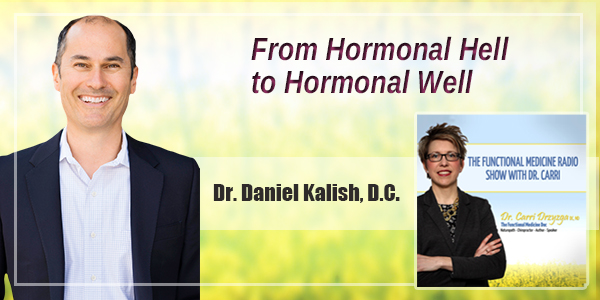Podcast: Play in new window | Download
Subscribe: Apple Podcasts | Android | RSS
In this episode of The Functional Medicine Radio Show, Dr. Carri’s special guest Dr. Dan Kalish explains how you can go from hormonal hell to hormonal well by healing your gut.
Dr. Kalish is a pioneer and founder of The Kalish Method – a model of Functional Medicine which solves patients’ health challenges through a proven lab based program addressing the three key areas of health: hormones, the digestive tract, and detoxification. He has trained practitioners from Dr. Mercola’s medical staff to Mayo Clinic physicians to ME!
He is the author of two books, “The Kalish Method: Healing the Body, Mapping the Mind” and “Your Guide to Healthy Hormones”. Dr. Kalish is a frequently requested speaker for health summits across the United States.
Main Questions Asked:
- What are the three big areas of health patients should look at?
- Can you describe the causation sequence of how hormonal imbalances start?
- As the gut starts to break down and you start getting these infections that will lay the groundwork for food sensitivities, how does that translate into the whole toxic mess?
- Can you give us a real world example of a case from your private practice going through the sequence of events then the sequence of treatment?
Key Points made by Dr. Kalish:
- The main thing about functional medicine is at one level, it’s quite simple. The more we can translate it into simple language, the more people can understand it and take advantage of it.
- There’s a logic to the order. People tend to get sick in a pretty specific way regardless of what the final disease is.
- People get sick because they’re stressed and they don’t take care of themselves. Their gut starts to fail and then their liver becomes toxic. So we look at these three basic systems: stress hormone physiology, digestive function and then toxins, and the liver and detoxification, in that order. Or all three of them if we’re able to do all of the lab testing.
- It’s the model by which people end up developing problems but it’s also the model by which we usually treat people. We address stress and stress hormones first, then fix the gut, then detoxification, in that order.
- From a patient’s perspective, they’re just thinking about how crappy they feel today. They’re having hot flashes or night sweats or can’t get pregnant or they have PCOS or PMS or migraines or food cravings at certain times of the month. There’s some clear sex hormone-related symptom.
- For men, it’s typically low sex drive; hence, the advent of things like Viagra. These are pretty universal problems that both men and women experience. It’s sex hormone imbalances. Then it’s logical to think that you’ve got a hormone imbalance and just want to fix your sex hormones and then you’ll be better.
- The problem is that there’s usually a sequence of events that’s led to the sex hormone imbalance and that usually starts with the stress response in the adrenal glands, bleeds over into the digestive tract, and ends up fulminating as a male or female hormonal imbalance.
- If you treat the sex hormones directly, initially by themselves, it usually doesn’t work very well. People and doctors get very frustrated. If you just look at low estrogen, testosterone or progesterone, and just prescribe an individual hormone, and ignore the sequence of events that got a person there, it doesn’t work very well.
- Our model of functional medicine tries to take a step back from the symptoms and ask what the predictable reasons are why this hormonal imbalance would have occurred. A very large percentage of the time, we see it centered around digestive health.
- If you think about a slow leak in a tire, you put air in it, then a month later it looks low again. It’s pretty clear that you could put air in to temporarily solve the problem but there’s a puncture somewhere that’s causing the slow leak. That’s how the sex hormones work.
- If you’re low in progesterone, estrogen or testosterone and you take those hormones, it’s like filling up the tire with the slow leak. Sure, it’ll work for a few weeks or even up to a year or two but eventually it’s not going to work because there’s some other problem. Usually the slow leak is coming because of stress being placed on the adrenal hormones. If we can test and correct the adrenal hormones, then all of a sudden, the sex hormone issues start to stabilize and are very easy to handle.
- There are three major factors that make us sick: Emotional and spiritual disconnection – this is the leading trigger of health problems; Dietary stress; Inflammatory stress
- Usually it’s a combination emotional, dietary, and inflammatory stress that throws off the adrenal hormones.
- This one adrenal hormone called cortisol skyrockets. The first thing that occurs when that happens is we start to break down the gut lining. This is the direct connection between hormones and the gut.
- When we’re stressed, we break things down. One of the first structures we break down to try to get fuel is the gut lining. As soon as you have some kind of emotional, dietary or inflammatory stress, your gut lining is going to be deteriorating, your immune cells aren’t going to work as well and you’re likely going to pick up a food reaction type problem or some kind of infection in the gut. As that starts to kick into gear, your sex hormone level starts to drop because when cortisol goes up the female hormones start to drop in response to that because you’re burning up so much cortisol that estrogen, progesterone and testosterone start to drop.
- I’ve been in practice for 23 years and I’ve never seen an exception to this. I’m sure they do exist. I’m sure there are women out there who have had spontaneous failure of her ovaries unrelated to the whole rest of her body but I’ve never seen it.
- Often times the most important thing that we want to treat is not the first thing that we treat.
- Toxins in the body can come from two places. It can be auto-toxicity meaning you’re generating toxins yourself and they could come from an external source. There are a lot of chemicals and heavy metals that we’re exposed to.
- Between the internally generated toxins that are coming from your gut not working properly and the external toxins, that whole toxic stew gets dumped right on your liver, and in general, they say now every American has somewhere between 122 and up to 400 or 700 toxins at any one time.
- Every single person has at least 122 toxins in their body right now. There’s no one who’s immune to this. It doesn’t matter how pristine your environment is or how much organic food you eat, we’re all basically toxic. That becomes a problem too because you process your hormones in your liver as well. So that will contribute even more to any kind of hormone imbalance if there’s a liver toxicity issue.
- A lot of these toxins are endocrine disrupters. They mimic hormones. You get this chemical plastic derivative thing in your body and it looks almost exactly like estrogen to all your cells and so your body tries to utilize it like estrogen and that causes a whole heck of a lot of problems too.
- Even if you get the lifestyle stuff figured out, you’re meditating for a couple of hours every day, you’re eating well, you’re getting plenty of sleep, you’re exercising properly, just the fact that there are so many environmental toxins, pretty much means that we all need some kind of treatment these days. I don’t want to be Debbie Downer here but the modern world is not something our bodies can handle on its own anymore. Maybe a couple hundred years ago you could.
- I don’t think it’s possible for people to be healthy without at least a yearly check up with your functional medicine doctor. It’s a reasonable thing just to keep yourself on track once you do get healthy.
- I just hate to see people struggling on their own for so many years when it’s relatively straight forward for us to help people if we can get the labs done and start to analyze things.
- Women and men react to stress in some ways very similarly and in some ways very differently. The male stress physiology is fight or flight. They will either pick up a spear to kill the tiger or they will run away. Women do a bit of fight or flight but they also do tend and befriend. Their stress hormones escalate, like a man’s would, but they also release other hormones that calm them down a little bit. So women are less likely to pick up a spear and kill someone. They’re more likely to grab a child nearby and take care of them, that’s the tend part. And they’re more likely to connect with other women in the community, that’s the befriend part. They try to have a more community-based solution to whatever this potential stress is.
- Women have a slightly different hormonal response but in our culture, women are under so much emotional pressure from the work world and family that they tend to have as many cortisol problems as the men do even though they have this in-born system for them to take care of themselves a bit better.
- My favorite female patient is in her mid-30s and a helicopter pilot. She came in with chest wall pain, digestive problems and she wants to get pregnant and she can’t. We ran an adrenal panel, looked at her hormones, checked out the gut and toxicity issues. It turned out her whole problem centered around an infection called Giardia. It’s a pretty common intestinal parasite. Running a stool test, finding and treating the Giardia, and then working on her adrenals, within 3 or 4 months, she was pregnant.
- It’s an interesting pattern. The more you have of a drag on the digestive tract, the more inflammation you get the lower your sex hormones go. Many times with women, if we simply put them on gluten-free diet and treat a parasite, they’ll find that their natural fertility comes right back.
- You could Google Celiac disease and fertility, there are hundreds of research studies, mostly done in Europe, on the connection between gluten and inflammation in the gut and infertility. That extends out to older women too who are going through perimenopause and are having hot flashes and night sweats. It’s the same kind of pattern.
- My favorite male patient is in his late 50s. A very nice, happily married man. That’s one of my tenets of overall health is a good long-term relationship. Bad marriages destroy people’s health no matter what.
- He’s a marathon runner and he finally had this crash where he was training for his marathons as he’s always done. He picked up H. Pylori on a trip somewhere overseas. This was going on for two years. Medical doctors were testing him and couldn’t figure out what was going on with him and he all of a sudden completely collapsed and wasn’t able to exercise anymore.
- We got him on a good quality adrenal program, started to give him a little extra DHEA because he had really low testosterone and low sex drive, and got his H. Pylori cleared up. Now he’s on the road to recovery.
- It’s so satisfying to be able to solve these problems with just a couple of relatively simple labs. It’s not even that complicated really.
- Symptoms don’t necessarily correlate with what the origin of the problem is. That’s what makes functional medicine so difficult. It’s not symptomatically oriented. If we can think of body systems and have a clear model of treatment, then you can address symptoms, not one to one like this pill for that symptom but in a more comprehensive manner.
- Functional medicine is just coming into its own. It’s so exciting for me to talk to doctors everyday and see how well the public is starting to receive this message that we’ve been hammering away at for 20 years.
- There’s a direct relationship between the length of time that you’ve had a female hormone problem, how severe the symptoms are and how damaged the gut is. It’s not that they’re connected, they’re literally different sides of the same coin. They’re not just related, they’re the same problem. We just see it from different ways. The common link is chronic inflammation because it destroys our gut lining and our hormone output simultaneously.
- You can’t have chronic inflammation and have your gut be okay or female hormones be okay. It’s impossible. That’s why these two things are not just linked, they’re really two aspects of the same exact problem – gut health and hormones.
Resources Mentioned:
Book – The Kalish Method: Healing the Body, Mapping the Mind
Book – Your Guide to Healthy Hormones
Dr. Kalish’s website for patients
Dr. Kalish’s website for doctors
Book – Reclaim Your Energy and Feel Normal Again
Thank you for listening! If you enjoyed this podcast, please subscribe and leave a 5 star rating and review on iTunes!







